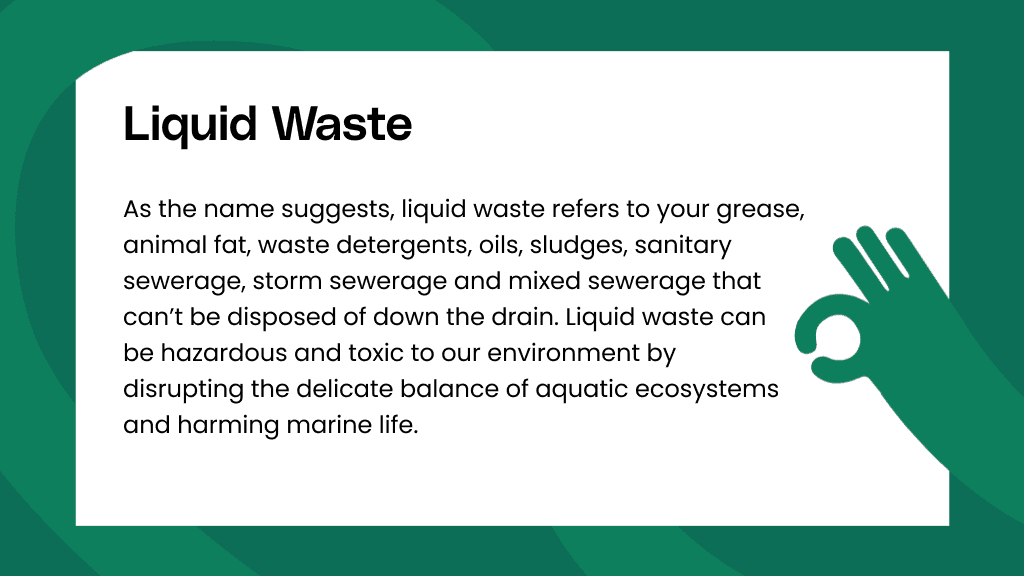The Facts About Reclaim Waste Revealed
The Facts About Reclaim Waste Revealed
Blog Article
Things about Reclaim Waste
Table of ContentsWhat Does Reclaim Waste Do?Some Ideas on Reclaim Waste You Should KnowReclaim Waste Can Be Fun For Everyone7 Easy Facts About Reclaim Waste ExplainedAbout Reclaim Waste
Check out the types, occurrences, and kinds of fluid waste. Domestic sewage waste describes the waste and items from a household septic system. This sort of waste is created by humans in residences, institutions, and other buildings. This only consists of septic storage tanks that have a drainpipe area. The appropriate management and disposal of residential sewage waste require liquid waste to be moved to a sewer treatment plant where the appropriate techniques and devices are put on purify and dispose of waste.
Business waste usually includes possible threats, such as flammable products or a mixture of fluid and strong waste products, and needs an advanced and thorough disposal procedure. The disposal of commercial waste commonly involves the purification of waste before transport to make certain risk-free and correct disposal. Hazardous waste is produced from results and runoff of commercial processes and production.
This kind of waste can not make use of the same sewage monitoring transportation or processes as septic or industrial liquids. The hazardous waste management process needs the inspection and screening of fluid waste before it undergoes the disposal process (liquid waste removal melbourne). Drainage waste is the fluid waste that originates from runoff and excess stormwater in extremely inhabited locations or cities
Drainage waste can trigger contamination and flooding if not managed properly. Ensuring appropriate waste management can prevent catastrophes and lower environmental harm.
Top Guidelines Of Reclaim Waste
Call PROS Solutions today to find out about our waste administration and disposal services and the appropriate ways to care for the fluid waste you produce.
(https://blogfreely.net/reclaimwaste1/yc311a58b1)Do you recognize what happens to your water when you draw the plug, purge the commode or drain pipes the washing device? No? Well, it deserves recognizing. This supposed 'wastewater' is not only a vital resource but, after treatment, will certainly be launched to our land, waterways or the sea. Utilized water from bathrooms, showers, baths, kitchen sinks, washings and commercial processes is referred to as wastewater.

water used to cool down machinery or tidy plant and equipment). Stormwater, a form of wastewater, is overflow that moves from agricultural and city areas such as roofs, parks, gardens, roadways, courses and rain gutters right into stormwater drains, after rainfall. Stormwater streams neglected straight to regional creeks or rivers, eventually getting to the sea.
The Single Strategy To Use For Reclaim Waste
In Queensland, most wastewater is dealt with at sewer treatment plants. Wastewater is transferred from domestic or industrial sites with a useful reference system of drains and pump terminals, known as sewerage reticulation, to a sewage treatment plant. City governments build, preserve and operate most sewage treatment plants. Operators are licensed under the Environmental Protection Act 1994 to release cured wastewater at an appropriate ecological requirement into rivers.
The Department of Natural Resources suggests neighborhood federal governments concerning handling, operating and keeping sewage systems and therapy plants. In unsewered locations, regional governments might call for owners to mount private or home sewage therapy systems to deal with residential wastewater from toilets, kitchen areas, washrooms and washings. The Department of Natural Resources authorises the use of home systems when they are proven to be effective.
In some new neighborhoods, therapy of some stormwater to remove trash, sand and crushed rock has actually started using gross pollutant traps. Wastewater treatment takes place in four phases: Gets rid of solid matter.
Wastewater after that streams into big containers where solids work out and are removed as sludge. Grease and residue are skimmed from the surface. Utilizes tiny living microorganisms referred to as micro-organisms to break down and eliminate remaining dissolved wastes and fine fragments. Micro-organisms and wastes are included in the sludge. Removes nitrogen and phosphorus nutrients that could trigger algal blooms in our waterways and intimidate aquatic life.
All About Reclaim Waste
Nutrient elimination is not readily available at all sewer therapy plants since it needs costly specialised tools. Clear fluid effluent generated after therapy may still include disease-causing micro-organisms - liquid waste disposal.

This normally suggests wastewater has actually to be treated or contaminants eliminated prior to it can be discharged to waterways. A lot of wastewater streams into the sewerage system. Under the Act, neighborhood federal governments provide approvals and licences for environmentally relevant tasks (Ages) entailing wastewater launches that may have a regional effect. The department provides approvals and licences to Ages entailing wastewater releases that might have a regional or statewide effect.
The Best Strategy To Use For Reclaim Waste
Otherwise, samples are considered laboratory analysis. Often many examinations are required to establish the degrees of each of the various toxins such as oils, hefty steels and chemicals in water. Monitoring provides factual info concerning water quality and can verify that permit problems are being met. The info gotten through monitoring supplies the basis for making water top quality decisions.
Report this page